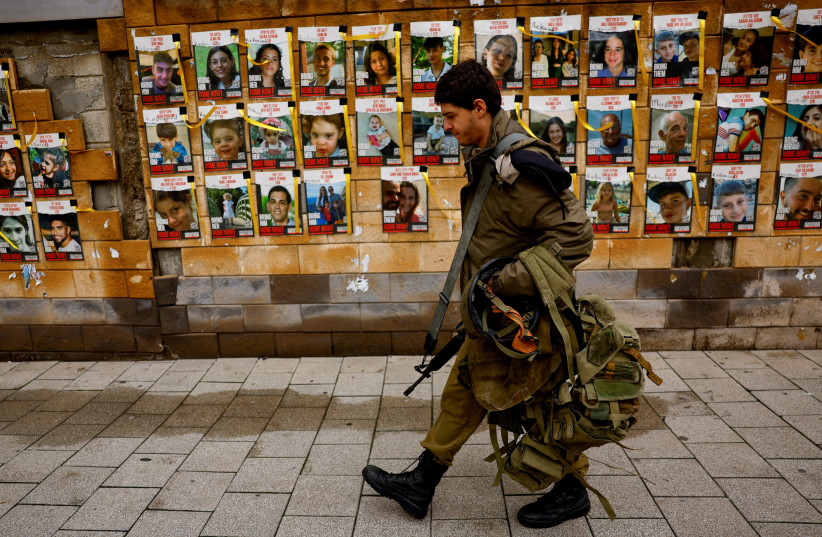The IDF revealed plans on Wednesday to increase the length of both mandatory and reservist service in the military due to the needs presented by the war and troop losses. The planned changes are to already existing laws, which will need to be approved by the Knesset.
The suggested changes are:
• Mandatory service will be lengthened to three years;
• The age of reservist exception will rise from 40 to 45;
• The age of exemption for reservist officers will rise to 50;
• The number of mandatory reserve duty days per year will double.
The IDF is not expected to try to publicly push the coalition – which currently has two haredi parties that oppose the draft – to more equally integrate the haredi sector into the military, which is experiencing severe losses that are felt by every other sector.

Reservists to serve 40 days per year, up from 25
New recruits, mandatory service: Prior to October 7, certain recruits served 28 months, while mandatory service soldiers were set to serve 32. Due to the high demand prompted by the war, all new recruits and current serving soldiers will have their service extended to 36 months.
Reservists: Prior to October 7, the tracks for reservist duty at ages were 40, 45, and 49, depending on their roles. The IDF is suggesting extending the service from age 40 to 45, from 45 to 50, and from 49 to 52. A special category of reservist volunteers would now be asked to continue up to age 66. The plan also includes a variety of other specific reservist extensions.
Besides the extension of service time, many operational reservists will also need to serve 40 days per year instead of 25, while others could be increased even more. These changes would be reflected in compensation, with specific, more essential units getting higher raises in pay than others.
Mandatory service soldiers will also be paid significant bonuses comparable to initial officer pay for the additional months of service they will need to perform beyond what they originally signed up for.
Until the law is approved by the Knesset, Draft Order 8, which gives the IDF emergency temporary discretion to increase service times, is expected to remain in effect. The spirit of the plan provides for a larger standing and reserve army over a longer period of time without the need for Draft Order 8.
The reservists command will also be more formally split up into different levels of importance, with a second level of reservists serving more on a volunteer basis within the framework of defending specific towns they reside in.
About 70,000 reservists in a third level may serve less time, but they will still be available to carry out specific duties as needed and could still be called up for extended service in the event of a war.
The number of reservists at any given time will multiply exponentially by five times.
These changes come as the IDF not only needs to fight more intensely than usual on more fronts than usual, but where 563 soldiers were killed during the war, 2,830 were wounded and hospitalized, and another 9,053 were wounded but not hospitalized.
About 55% of the soldiers killed during the invasion of Gaza (130) have been reservists, with reservists making up some 10% of all combat forces, whereas it was at closer to 2% before the war.
The IDF said it is spending more time trying to take care of reservists’ wider needs, including their families. Many of them are parents who need assistance with their families or to spend more time with them in creative ways. There are 116 widows and 352 orphans as a result of the war.
There has been a steady line of complaints that the IDF did act fast enough, or has not done enough, to protect reservist students from falling behind or being penalized in their university studies. Military sources said they were handling the issue, and that no student would ultimately lose out for having served the country, although the sources were short on specifics.
In the realm of mental-health awareness and treatment, 25,890 soldiers received lectures about resilience and about how to track and handle potential problematic signs. The vast majority of such issues could be handled within the IDF command structure by commanders providing support and guidance, military sources said, adding that a significant minority of soldiers are provided with professional assistance.
The plan suggests a budgetary addition of NIS 450 million to compensate reservists and address the issues brought on by the war and the longer service times.
At the beginning of the war, the IDF had the ability to call up 360,000 reservists. Some 287,000 have served since the war began, including 112,000 of whom have families, 50,000 who are volunteers, and 40,000 who are women. About 130,000 reservists are currently serving.
From a sectoral perspective, the IDF said 450 haredi men have volunteered for the war effort – separate from the already serving haredi soldiers, such as the Netzah Yehuda Battalion, formerly known as Nahal Haredi – a miniscule participation by comparison. Exemptions for haredim have been in place for decades, and the High Court of Justice has consistently said they are illegal. It still has petitions pending before it on the issue, but it has repeatedly allowed governments to delay a resolution.
The Brothers in Arms NGO vowed to return the issue to the public discourse, calling the new plan a disaster in terms of inequality because it allows haredim to continue to not serve in a disproportionate manner.
